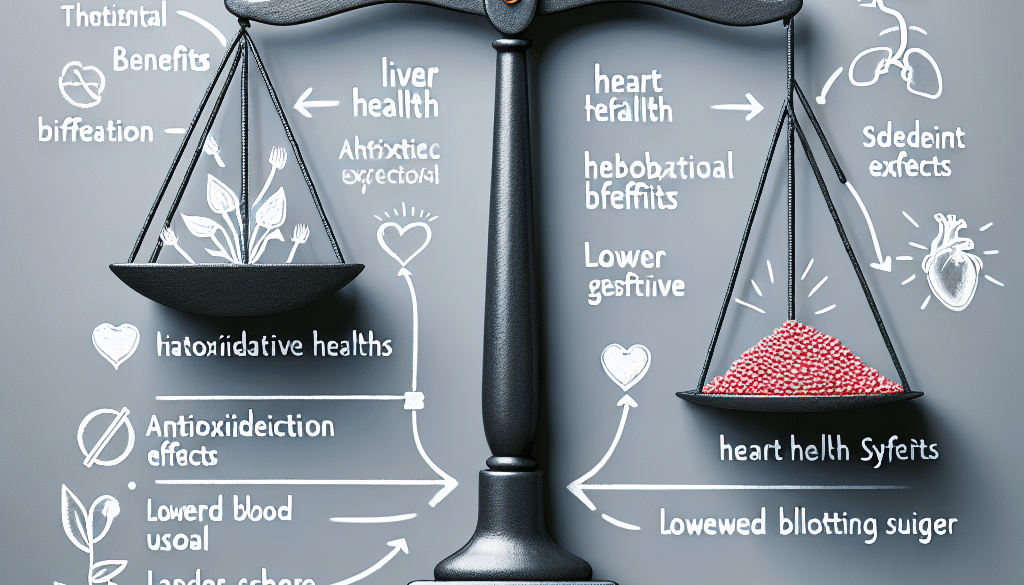Is there a downside to taking milk thistle?
-
Table of Contents
- Milk Thistle: Exploring the Potential Downsides of This Herbal Supplement
- Understanding Milk Thistle and Its Benefits
- Potential Side Effects and Interactions of Milk Thistle
- Case Studies and Research Findings
- Recommended Dosage and Overconsumption Risks
- Special Considerations and Precautions
- Conclusion: Balancing the Pros and Cons
- Discover ETChem’s Protein Products
Milk Thistle: Exploring the Potential Downsides of This Herbal Supplement

Milk thistle, a natural herb that has been used for centuries for its liver-protecting properties, is often touted as a detoxifying miracle. However, as with any supplement, it’s essential to consider both the benefits and potential downsides. In this article, we’ll delve into the science behind milk thistle, its uses, and the possible risks associated with its consumption.
Understanding Milk Thistle and Its Benefits
Milk thistle, scientifically known as Silybum marianum, contains active compounds collectively referred to as silymarin. Silymarin is believed to have antioxidant, antiviral, and anti-inflammatory properties. Here are some of the well-known benefits of milk thistle:
- Protects the liver from toxins and promotes liver regeneration.
- May help control blood sugar levels in people with diabetes.
- Potentially supports cancer treatment by inhibiting the growth of certain cancer cells.
- Could help reduce cholesterol levels, benefiting heart health.
Potential Side Effects and Interactions of Milk Thistle
Despite its benefits, milk thistle is not free from potential side effects. Some individuals may experience:
- Gastrointestinal issues such as diarrhea, nausea, bloating, and upset stomach.
- Allergic reactions, particularly in those allergic to plants in the same family (e.g., ragweed, chrysanthemums, marigolds, and daisies).
- It may lower blood sugar levels, which can be a concern for people with diabetes or those taking medications that affect blood sugar.
Moreover, milk thistle can interact with various medications, including but not limited to:
- Drugs metabolized by the liver’s enzyme system, potentially leading to altered drug effectiveness or increased side effects.
- Blood thinners, antiplatelet drugs, and anti-inflammatory medications, which could increase the risk of bleeding.
- Cholesterol-lowering statins, as milk thistle can interfere with their breakdown.
Case Studies and Research Findings
Several studies have investigated the effects of milk thistle on liver diseases, such as hepatitis and cirrhosis. While some research suggests benefits, other studies have found minimal or no effect. For instance, a study published in the Journal of Hepatology found that milk thistle did not significantly improve liver function tests in patients with hepatitis C.
Another area of research is the use of milk thistle in cancer treatment. While laboratory studies have shown that silymarin can inhibit the growth of cancer cells, human studies are limited and have not yet provided conclusive evidence of its efficacy.
Recommended Dosage and Overconsumption Risks
The appropriate dosage of milk thistle can vary depending on the individual and the condition being treated. Standardized milk thistle extract is typically taken in doses ranging from 140 to 800 milligrams per day. However, it’s crucial to consult with a healthcare provider before starting any new supplement regimen.
Overconsumption of milk thistle can lead to various issues, such as:
- Exacerbation of the side effects mentioned earlier.
- Potential for liver damage if taken in extremely high doses over a long period.
- Increased risk of drug interactions and complications.
Special Considerations and Precautions
While milk thistle is generally considered safe for most people, certain populations should exercise caution or avoid it altogether:
- Pregnant and breastfeeding women, due to the lack of sufficient safety data.
- Individuals with a history of hormone-related cancers, as silymarin might mimic the effects of estrogen.
- Those with liver conditions should consult a doctor to ensure milk thistle won’t interfere with their treatment.
Conclusion: Balancing the Pros and Cons
Milk thistle has a long history of use as a herbal remedy, particularly for liver-related ailments. While it offers several potential health benefits, it’s not without its downsides. Side effects, interactions with medications, and the need for caution in certain populations are all factors to consider. As with any supplement, it’s best to consult with a healthcare professional before incorporating milk thistle into your regimen.
Discover ETChem’s Protein Products
If you’re looking for high-quality protein supplements to complement your health regimen, consider exploring ETChem’s range of protein products. ETChem is a reputable Chinese Collagen factory manufacturer and supplier, offering a variety of collagens, including marine, fish, bovine, chicken, and types I, II, and III. Their products are known for their neutral taste and instant solubility, making them a great addition to various industries.
ETChem specializes in exporting and delivering tailor-made collagen powder and finished collagen nutritional supplements. Their extensive product range caters to sectors like Food and Beverage, Sports Nutrition, Weight Management, Dietary Supplements, Health and Wellness Products, ensuring comprehensive solutions to meet all your protein needs.
As a trusted company by leading global food and beverage brands and Fortune 500 companies, ETChem reinforces China’s reputation in the global arena. For more information or to sample their products, please contact them and email karen(at)et-chem.com today.
About ETChem:
ETChem, a reputable Chinese Collagen factory manufacturer and supplier, is renowned for producing, stocking, exporting, and delivering the highest quality collagens. They include marine collagen, fish collagen, bovine collagen, chicken collagen, type I collagen, type II collagen and type III collagen etc. Their offerings, characterized by a neutral taste, instant solubility attributes, cater to a diverse range of industries. They serve nutraceutical, pharmaceutical, cosmeceutical, veterinary, as well as food and beverage finished product distributors, traders, and manufacturers across Europe, USA, Canada, Australia, Thailand, Japan, Korea, Brazil, and Chile, among others.
ETChem specialization includes exporting and delivering tailor-made collagen powder and finished collagen nutritional supplements. Their extensive product range covers sectors like Food and Beverage, Sports Nutrition, Weight Management, Dietary Supplements, Health and Wellness Products, ensuring comprehensive solutions to meet all your protein needs.
As a trusted company by leading global food and beverage brands and Fortune 500 companies, ETChem reinforces China’s reputation in the global arena. For more information or to sample their products, please contact them and email karen(at)et-chem.com today.




